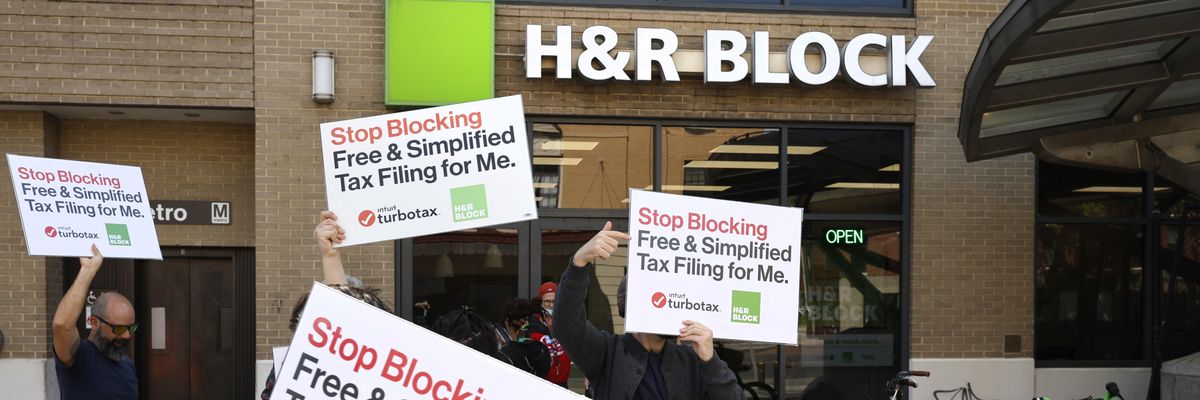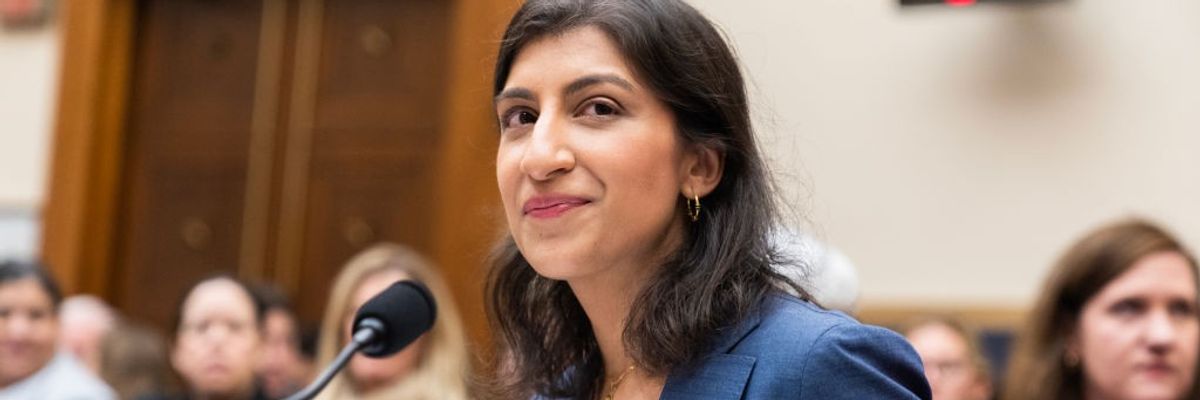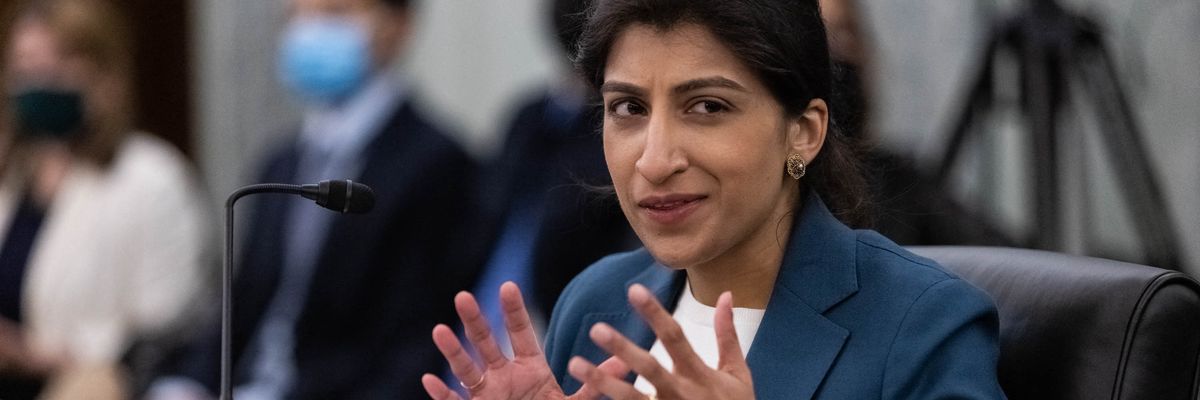ALT. BUSINESS NEWS
"Following the most lucrative election in history for special interests," said the senator, "my bill will empower workers to hold corporations to responsible decisions that benefit more than just shareholders."

U.S. Sen. Elizabeth Warren (D-Mass.) speaks during a January 11, 2024 hearing on Capitol Hill in Washington, D.C.
(Photo: Tom Williams/CQ-Roll Call, Inc. via Getty Images)
Julia Conley
Dec 11, 2024
COMMON DREAMS
Aiming to confront "a root cause of many of America's fundamental economic problems," U.S. Sen. Elizabeth Warren on Wednesday unveiled a bill to require corporations to balance growth with fair treatment of their employees and consumers.
The Massachusetts Democrat introduced the Accountable Capitalism Act, explaining that for much of U.S. history, corporations reinvested more than half of their profits back into their companies, working in the interest of employees, customers, business partners, and shareholders.
In the 1980s, said Warren corporations began placing the latter group above all, adopting "the belief that their only legitimate and legal purpose was 'maximizing shareholder value.'"
That view was further cemented in 1997 when the Business Roundtable, a lobbying group that represents chief executives across the country, declared that the "principal objective of a business enterprise is to generate economic returns to its owners."
Now, Warren said in a policy document, "around 93% of American-held corporate shares are owned by just 10% of our nation's richest households, while more than 40% of American households hold no shares at all."
"This means that corporate America's commitment to 'maximizing shareholder return' is a commitment to making the rich even richer, while leaving workers and families behind," said Warren in a statement.
The Accountable Capitalism Act would require:Corporations with more than $1 billion in annual revenue to obtain a federal charter as a "United States corporation," obligating executives to consider the interests of all stakeholders, not just investors;
Corporate political spending to be approved by at least 75% of a company's shareholders and 75% of its board of directors; and
At least 40% of a company's board of directors to be selected by employees.
The bill would also prohibit directors of U.S. corporations from selling company shares within five years of receiving them or within three years of a company stock buyback.
Warren noted that as companies have increasingly poured their profits into stock buybacks to benefit shareholders, worker productivity has steadily increased while real wages have gone up only slightly. The share of national income that goes to workers has also significantly dropped.
"Workers are a major reason corporate profits are surging, but their salaries have barely moved while corporations' shareholders make out like bandits," said Warren told The Guardian. "We need to stand up for working people and hold giant companies responsible for decisions that hurt workers and consumers while lining shareholders' pockets."
The senator highlighted that big business interests invested heavily in November's U.S. presidential election.
"Following the most lucrative election in history for special interests," she said, "my bill will empower workers to hold corporations to responsible decisions that benefit more than just shareholders."
Doing For-Profit Tax Industry's Bidding, GOP Calls On Trump to Cancel Direct File Program
"This is the most efficient way and cost-efficient way for millions of people to pay their taxes," said one advocate.

Advocates gather in Washington, D.C. to call out tax prep companies like Intuit TurboTax and H&R Block for blocking simplified filing and to support Internal Revenue Service (IRS) exploration of alternative free tax filing on April 17, 2023.
(Photo: Tasos Katopodis/Getty Images for Economic Security Project)
Julia Conley
Dec 11, 2024
COMMON DREAMS
Responding to the "absurd" news that more than two dozen U.S. House Republicans are calling on President-elect Donald Trump to end the Internal Revenue Service's Direct File program, Rep. Gerry Connolly came to one conclusion: "Republicans want to make your lives more difficult."
The Virginia Democrat wasn't alone in denouncing a letter penned by Reps. Adrian Smith (R-Neb.) and Chuck Edwards (R-N.C.) and signed by at least 27 other Republicans who called on Trump to sign a "day-one executive order" to end the free tax-filing program that allowed roughly 140,000 taxpayers to save an estimated $5.6 million in filing costs this year.
Direct File, which was introduced as a pilot program in 12 states in the last tax filing season and is set to be expanded to 24 states and more than 30 million eligible taxpayers this year, is "a free, easy way for people to file their taxes directly online with IRS," said Sen. Elizabeth Warren (D-Mass.).
The software allows taxpayers to keep their entire tax refund "rather than paying $150 to a sleazy tax prep company," said the senator, adding that Republicans evidently want Americans "to keep wasting money on TurboTax," the popular tax filing program run by Intuit, which reported a net income of $2 billion in 2023 and spent $3.5 million on federal lobbying the previous year. The private tax filing industry has spent decades lobbying to ensure a system like Direct File wouldn't be made available to Americans.
In the letter, the Republicans claim the Direct File system is "unauthorized and wasteful" and that "the program's creation and ongoing expansion pose a threat to taxpayers' freedom from government overreach."
The Republican lawmakers also sent the letter to billionaire businessmen Elon Musk and Vivek Ramaswamy, Trump's nominees to lead the proposed Department of Government Efficiency (DOGE).
In the letter they claim to want to protect "hardworking Americans" from the "overreach" of the IRS, but as In the Public Interest founder and executive director Donald Cohen told Common Dreams on Wednesday, the Direct File program is "incredibly popular" with those who have used it.
"This is the most efficient way and cost-efficient way for millions of people to pay their taxes," Cohen said. "So what the Republicans want to do is make it more costly, more complicated, and more profitable for the big tax software vendors."
Cohen also questioned how Smith and Edwards could argue, as they do in the letter, that Direct File is a "clear conflict of interest."
"It is in all of our interests for the federal government to... collect taxes in the most efficient and cheapest way," he told Common Dreams.
On the contrary, he said, private tax software companies like Intuit and H&R Block are incentivized to fight against Direct File, which keeps them from collecting about $1 billion in filing fees as well as users' data.
At the Center on Budget and Policy Priorities, vice president of tax policy Chuck Marr said Republicans who signed Wednesday's letter are essentially pushing for "a tax on paying taxes."
Ernie Tedeschi, director of economics at the Yale Budget Lab and the former chief economist of the White House Council of Economic Advisers, argued that Direct File "does what policymakers should be in favor of: It makes a core government function more efficient and user-friendly, in a way that's accessible for everyone."
With Defeat of Megamerger, Sanders Thanks Khan for Taking On 'Corporate Greed'
"The proposed Kroger-Albertsons merger would have led to higher prices at the grocery store and harmed workers," said the Vermont senator.

FTC Chair Lina Khan prepares to testify during a congressional hearing in Washington, D.C. on July 13, 2023.
(Photo: Tom Williams/CQ-Roll Call, Inc. via Getty Images)
Jessica Corbett
Dec 11, 2024
COMMON DREAMS
Praise for Federal Trade Commission Chair Lina Khan continued to pour in on Wednesday after a pair of judges blocked the merger of grocery chains Kroger and Albertsons following challenges by the FTC and state attorneys general.
"The proposed Kroger-Albertsons merger would have led to higher prices at the grocery store and harmed workers," said U.S. Sen. Bernie Sanders. "Let me thank FTC Chair Lina Khan for successfully fighting this merger and standing up to corporate greed."
Congressman Mark Pocan (D-Wis.) also welcomed the rulings and sent "a big thank you to Lina Khan and her team at the FTC."
Their comments on Wednesday followed similar applause from Sen. Elizabeth Warren (D-Mass.) and Rep. Pramila Jayapal as well as groups including the American Economic Liberties Project (AELP) and Groundwork Collaborative.
Khan addressed the win during a Tuesday stream with political commentator Hasan Piker, noting that "this is the first time that the FTC has ever sought to block a merger not just because it's gonna be bad for consumers, but also because it's gonna be bad for workers."
Khan, an appointee of outgoing Democratic President Joe Biden, has won praise from progressives for taking on not only grocery giants and other companies trying to build monopolies but also Big Pharma and Big Tech.
Sanders recently called her "the best FTC chair in modern history" and AELP earlier this year published a document detailing how, under Khan's leadership, the agency "has entered a new era of more effective, modern, and democratic enforcement to better protect consumers, workers, and independent businesses."
Examples included in the AELP roundup include Khan's "crackdown on deceptive 'junk fees,'" a ban on noncompete clauses that's being challenged in court, a historic lawsuit against Amazon.com, and a "click-to-cancel" rule that requires sellers to "make it as easy for consumers to cancel their enrollment as it was to sign up."
However, the new era of the FTC is set to soon come to an end. Since President-elect Donald Trump's victory last month, speculation has been building that he would replace Khan with someone who would do the bidding of big business. Amid celebrations of the rulings against the Kroger-Albertsons merger on Tuesday, the Republican announced Andrew Ferguson as his pick for chair.
As Common Dreamsreported earlier Wednesday, Basel Musharbash, principal attorney at Antimonopoly Counsel, said that elevating Ferguson, who already sits on the FTC, to chair, "is an affront to the antitrust laws and a gift to the oligarchs and monopolies bleeding this country dry."
Although the agency is expected to be friendlier to mergers under the next Trump administration, Albertsons responded to the Tuesday rulings by bailing on the $24.6 billion deal and suing Kroger for billions of dollars on Wednesday, rather than appealing or moving to in-house FTC hearings.
That move could reflect industry fears of U.S. courts that are willing to block major mergers, as The American Prospect executive editor David Dayen pointed out after the federal court decision on Tuesday.
"The important thing here is not that Biden's enforcers blocked a merger... it's that courts are increasingly comfortable with merger enforcement," he said. "States can sue under the Sherman Act, and they will. The real change to track is in the judiciary. Wall Street, take note."
Judges Block Kroger-Albertsons Merger in 'Win for Farmers, Workers, and Consumers'
"We applaud the FTC for securing one of the most significant victories in modern antitrust enforcement," said one advocate.

Unionized grocery store workers rally to oppose the proposed merger of Kroger and Albertsons outside a Ralph's supermarket in Los Angeles, California on April 13, 2023.
(Photo: Frederic J. Brown/AFP via Getty Images)
Jessica Corbett
Dec 10, 2024
COMMON DREAMS
Antitrust advocates on Tuesday welcomed a pair of court rulings against the proposed merger of grocery giants Kroger and Albertsons, which was challenged by Federal Trade Commission Chair Lina Khan and multiple state attorneys general.
"The FTC, along with our state partners, scored a major victory for the American people, successfully blocking Kroger's acquisition of Albertsons," said Henry Liu, director of the commission's Bureau of Competition, in a statement. "This historic win protects millions of Americans across the country from higher prices for essential groceries—from milk, to bread, to eggs—ultimately allowing consumers to keep more money in their pockets."
"This victory has a direct, tangible impact on the lives of millions of Americans who shop at Kroger or Albertsons-owned grocery stores for their everyday needs, whether that's a Fry's in Arizona, a Vons in Southern California, or a Jewel-Osco in Illinois," he added. "This is also a victory for thousands of hardworking union employees, protecting their hard-earned paychecks by ensuring Kroger and Albertsons continue to compete for workers through higher wages, better benefits, and improved working conditions."
While Liu was celebrating the preliminary injunction from Oregon-based U.S. District Court Judge Adrienne Nelson, later Tuesday, King County Superior Court Judge Marshall Ferguson released a ruling that blocked the merger in Washington state.
"We're standing up to mega-monopolies to keep prices down," said Washington Attorney General Bob Ferguson. "We went to court to block this illegal merger to protect Washingtonians' struggling with high grocery prices and the workers whose jobs were at stake. This is an important victory for affordability, worker protections, and the rule of law."
Advocacy groups applauding the decisions also pointed to the high cost of groceries and the anticipated impact of Kroger buying Albertsons—a $24.6 billion deal first announced in October 2022.
"American families are the big winner today, thanks to the Federal Trade Commission. The only people who stood to gain from the potential merger between Albertsons and Kroger were their wealthy executives and investors," asserted Liz Zelnick of Accountable.US. "The rest of us are letting out a huge sigh of relief knowing today's victory is good news for competitive prices and consumer access."
Describing the federal decision as "a victory for commonsense antitrust enforcement that puts people ahead of corporations," Food & Water Watch senior food policy analyst Rebecca Wolf also pointed out that "persistently high food prices are hitting Americans hard, and a Kroger-Albertsons mega-merger would have only made it worse."
"Already, a handful of huge corporations' stranglehold on our food system means that consumers are paying too much for too little choice in supermarkets, workers are earning too little, and farmers and ranchers cannot get fair prices for their crops and livestock," she noted. "Today's decision and strengthened FTC merger guidelines help change the calculus."
Like Wolf, Farm Action president and co-founder Angela Huffman similarly highlighted that "while industry consolidation increases prices for consumers and harms workers, grocery mergers also have a devastating impact on farmers and ranchers."
"When grocery stores consolidate, farmers have even fewer options for where to sell their products, and the chances of them receiving a fair price for their goods are diminished further," Huffman explained. "Today's ruling is a win for farmers, workers, and consumers alike."
Some advocates specifically praised Khan—a progressive FTC chair whom President-elect Donald Trumpplans to replace with Andrew Ferguson, a current commissioner who previously worked as chief counsel to Senate Minority Leader Mitch McConnell (R-Ky.) and as Republican counsel on the Senate Judiciary Committee.
"Today's decision is a major win for shoppers and grocery workers. Families have been paying the price of unchecked corporate power in the food and grocery sector, and further consolidation would only worsen this crisis," declared Groundwork Collaborative executive director Lindsay Owens in a statement.
"FTC Chair Lina Khan's approach is the blueprint to deliver lower prices, higher wages, and an economy that works for everyone," Owens argued. "The rebirth of antitrust enforcement has protected consumers against the worst of corporate power in our economy and it would be wise to continue this approach."
Laurel Kilgour, research manager at the American Economic Liberties Project, called the federal ruling "a resounding victory for workers, consumers, independent retailers, and local communities nationwide—and a powerful validation of Chair Khan and the FTC's rigorous enforcement of the law."
"The FTC presented a strong case that Kroger and Albertsons fiercely compete head-to-head on price, quality, and service. The ruling is a capstone on the FTC's work over the past four years and includes favorable citations to the FTC's recent victories against the Tapestry-Capri, IQVIA-Propel, and Illumina-Grail mergers," Kilgour continued.
"The court also cites long-standing Supreme Court law which recognizes that Congress was also concerned with the impacts of mergers on smaller competitors," she added. "We applaud the FTC for securing one of the most significant victories in modern antitrust enforcement and for successfully protecting the public interest from harmful consolidation."
Despite the celebrations, the legal battle isn't necessarily over. The Associated Pressreported that "the case may now move to the FTC, although Kroger and Albertsons have asked a different federal judge to block the in-house proceedings," and Colorado is also trying to halt the merger in state court.
Booze Hound! Lina Khan, Not Done Yet, Targets Nation's Largest Alcohol Seller
"The FTC is doing what our government should be doing: using every tool possible to make life better for everyday Americans," said one advocate.

Federal Trade Commission Chair Lina Khan testifies before the House Judiciary Committee on Capitol Hill in Washington, D.C. on July 13, 2023.
(Photo: Graeme Jennings/Pool/AFP via Getty Images)
Brett Wilkins
Dec 12, 2024
COMMON DREAMS
The U.S. Federal Trade Commission on Thursday sued Southern Glazer's Wine and Spirits, alleging that the nation's largest alcohol distributor, "violated the Robinson-Patman Act, harming small, independent businesses by depriving them of access to discounts and rebates, and impeding their ability to compete against large national and regional chains."
The FTC said its complaint details how the Florida-based company "is engaged in anticompetitive and unlawful price discrimination" by "selling wine and spirits to small, independent 'mom-and-pop' businesses at prices that are drastically higher" than what it charges large chain retailers, "with dramatic price differences that provide insurmountable advantages that far exceed any real cost efficiencies for the same bottles of wine and spirits."
The suit comes as FTC Chair Lina Khan's battle against "corporate greed" is nearing its end, with U.S. President-elect Donald Trump announcing Tuesday that he plans to elevate Andrew Ferguson to lead the agency.
Emily Peterson-Cassin, director of corporate power at Demand Progress Education Fund, said Thursday that "instead of heeding bad-faith calls to disarm before the end of the year, the FTC is taking bold, needed action to fight back against monopoly power that's raising prices."
"By suing Southern Glazer under the Robinson-Patman Act, a law that has gone unenforced for decades, the FTC is doing what our government should be doing: using every tool possible to make life better for everyday Americans," she added.
According to the FTC:
Under the Robinson-Patman Act, it is generally illegal for sellers to engage in price discrimination that harms competition by charging higher prices to disfavored retailers that purchase similar goods. The FTC's case filed today seeks to ensure that businesses of all sizes compete on a level playing field with equivalent access to discounts and rebates, which means increased consumer choice and the ability to pass on lower prices to consumers shopping across independent retailers.
"When local businesses get squeezed because of unfair pricing practices that favor large chains, Americans see fewer choices and pay higher prices—and communities suffer," Khan said in a statement. "The law says that businesses of all sizes should be able to compete on a level playing field. Enforcers have ignored this mandate from Congress for decades, but the FTC's action today will help protect fair competition, lower prices, and restore the rule of law."
The FTC noted that, with roughly $26 billion in revenue from wine and spirits sales to retail customers last year, Southern is the 10th-largest privately held company in the United States. The agency said its lawsuit "seeks to obtain an injunction prohibiting further unlawful price discrimination by Southern against these small, independent businesses."
"When Southern's unlawful conduct is remedied, large corporate chains will face increased competition, which will safeguard continued choice which can create markets that lower prices for American consumers," FTC added.
Southern Glazer's published a statement calling the FTC lawsuit "misguided and legally flawed" and claiming it has not violated the Robinson-Patman Act.
"Operating in the highly competitive alcohol distribution business, we offer different levels of discounts based on the cost we incur to sell different quantities to customers and make all discount levels available to all eligible retailers, including chain stores and small businesses alike," the company said.
Peterson-Cassin noted that the new suit "follows a massive court victory for the FTC on Tuesday in which a federal judge blocked a $25 billion grocery mega-merger after the agency sued," a reference to the proposed Kroger-Albertsons deal.
"The FTC has plenty of fight left and so should all regulatory agencies," she added, alluding to the return of Trump, whose first administration saw relentless attacks on federal regulations. "We applaud the FTC and Chair Lina Khan for not letting off the gas in the race to protect American consumers and we strongly encourage all federal regulators to do the same while there's still time left."
'A Gift to the Oligarchs': Trump Pick to Replace Lina Khan Vowed to End 'War on Mergers'
"Andrew Ferguson is a corporate shill who opposes banning noncompetes, opposes banning junk fees, and opposes enforcing the Anti-Merger Act," said one antitrust attorney.

Andrew Ferguson, a Republican member of the Federal Trade Commission, was selected by President-elect Donald Trump to lead the agency on December 11, 2024.
(Photo: Federal Trade Commission)
Jake Johnson
Dec 11, 2024
COMMON DREAMS
President-elect Donald Trump's pick to lead the Federal Trade Commission vowed in his job pitch to end current chair Lina Khan's "war on mergers," a signal to an eager corporate America that the incoming administration intends to be far more lax on antitrust enforcement.
Andrew Ferguson was initially nominated by President Joe Biden to serve as a Republican commissioner on the bipartisan FTC, and his elevation to chair of the commission will not require Senate confirmation.
In a one-page document obtained by Punchbowl, Ferguson—who previously worked as chief counsel to Sen. Mitch McConnell (R-Ky.)—pitched himself to Trump's team as the "pro-innovation choice" with "impeccable legal credentials" and "proven loyalty" to the president-elect.
Ferguson's top agenda priority, according to the document, is to "reverse Lina Khan's anti-business agenda" by rolling back "burdensome regulations," stopping her "war on mergers," halting the agency's "attempt to become an AI regulator," and ditching "novel and legally dubious consumer protection cases."
Trump announced Ferguson as the incoming administration's FTC chair as judges in Oregon and Washington state blocked the proposed merger of Kroger and Albertsons, decisions that one antitrust advocate called a "fantastic culmination of the FTC's work to protect consumers and workers."
According to a recent report by the American Economic Liberties Project, the Biden administration "brought to trial four times as many billion-dollar merger challenges as Trump-Pence or Obama-Biden enforcers did," thanks to "strong leaders at the FTC" and the Justice Department's Antitrust Division.

In a letter to Ferguson following Trump's announcement on Tuesday, FTC Commissioners Alvaro Bedoya and Rebecca Kelly Slaughter wrote that the document obtained and published by Punchbowl "raises questions" about his priorities at the agency mainly "because of what is not in it."
"Americans pay more for healthcare than anyone else in the developed world, yet they die younger," they wrote. "Medical bills bankrupt people. In fact, this is the main reason Americans go bankrupt. But the document does not mention the cost of healthcare or prescription medicine."
"If there was one takeaway from the election, it was that groceries are too expensive. So is gas," the commissioners continued. "Yet the document does not mention groceries, gas, or the cost of living. While you have said we're entering the 'most pro-worker administration in history,' the document does not mention labor, either. Americans are losing billions of dollars to fraud. Fraudsters are so brazen that they impersonate sitting FTC commissioners to steal money from retirees. The word 'fraud' does not appear in the document."
"The document does propose allowing more mergers, firing civil servants, and fighting something called 'the trans agenda,'" they added. "Is all of that more important than the cost of healthcare and groceries and gasoline? Or fighting fraud?"
As an FTC commissioner, Ferguson voted against rules banning anti-worker noncompete agreements and making it easier for consumers to cancel subscriptions. Ferguson was also the only FTC member to oppose an expansion of a rule to protect consumers from tech support scams that disproportionately impact older Americans.
"Andrew Ferguson is a corporate shill who opposes banning noncompetes, opposes banning junk fees, and opposes enforcing the Anti-Merger Act," said Basel Musharbash, principal attorney at Antimonopoly Counsel. "Appointing him to chair the FTC is an affront to the antitrust laws and a gift to the oligarchs and monopolies bleeding this country dry."
"Andrew Ferguson is a corporate shill who opposes banning noncompetes, opposes banning junk fees, and opposes enforcing the Anti-Merger Act," said one antitrust attorney.

Andrew Ferguson, a Republican member of the Federal Trade Commission, was selected by President-elect Donald Trump to lead the agency on December 11, 2024.
(Photo: Federal Trade Commission)
Jake Johnson
Dec 11, 2024
COMMON DREAMS
President-elect Donald Trump's pick to lead the Federal Trade Commission vowed in his job pitch to end current chair Lina Khan's "war on mergers," a signal to an eager corporate America that the incoming administration intends to be far more lax on antitrust enforcement.
Andrew Ferguson was initially nominated by President Joe Biden to serve as a Republican commissioner on the bipartisan FTC, and his elevation to chair of the commission will not require Senate confirmation.
In a one-page document obtained by Punchbowl, Ferguson—who previously worked as chief counsel to Sen. Mitch McConnell (R-Ky.)—pitched himself to Trump's team as the "pro-innovation choice" with "impeccable legal credentials" and "proven loyalty" to the president-elect.
Ferguson's top agenda priority, according to the document, is to "reverse Lina Khan's anti-business agenda" by rolling back "burdensome regulations," stopping her "war on mergers," halting the agency's "attempt to become an AI regulator," and ditching "novel and legally dubious consumer protection cases."
Trump announced Ferguson as the incoming administration's FTC chair as judges in Oregon and Washington state blocked the proposed merger of Kroger and Albertsons, decisions that one antitrust advocate called a "fantastic culmination of the FTC's work to protect consumers and workers."
According to a recent report by the American Economic Liberties Project, the Biden administration "brought to trial four times as many billion-dollar merger challenges as Trump-Pence or Obama-Biden enforcers did," thanks to "strong leaders at the FTC" and the Justice Department's Antitrust Division.

In a letter to Ferguson following Trump's announcement on Tuesday, FTC Commissioners Alvaro Bedoya and Rebecca Kelly Slaughter wrote that the document obtained and published by Punchbowl "raises questions" about his priorities at the agency mainly "because of what is not in it."
"Americans pay more for healthcare than anyone else in the developed world, yet they die younger," they wrote. "Medical bills bankrupt people. In fact, this is the main reason Americans go bankrupt. But the document does not mention the cost of healthcare or prescription medicine."
"If there was one takeaway from the election, it was that groceries are too expensive. So is gas," the commissioners continued. "Yet the document does not mention groceries, gas, or the cost of living. While you have said we're entering the 'most pro-worker administration in history,' the document does not mention labor, either. Americans are losing billions of dollars to fraud. Fraudsters are so brazen that they impersonate sitting FTC commissioners to steal money from retirees. The word 'fraud' does not appear in the document."
"The document does propose allowing more mergers, firing civil servants, and fighting something called 'the trans agenda,'" they added. "Is all of that more important than the cost of healthcare and groceries and gasoline? Or fighting fraud?"
As an FTC commissioner, Ferguson voted against rules banning anti-worker noncompete agreements and making it easier for consumers to cancel subscriptions. Ferguson was also the only FTC member to oppose an expansion of a rule to protect consumers from tech support scams that disproportionately impact older Americans.
"Andrew Ferguson is a corporate shill who opposes banning noncompetes, opposes banning junk fees, and opposes enforcing the Anti-Merger Act," said Basel Musharbash, principal attorney at Antimonopoly Counsel. "Appointing him to chair the FTC is an affront to the antitrust laws and a gift to the oligarchs and monopolies bleeding this country dry."
No comments:
Post a Comment